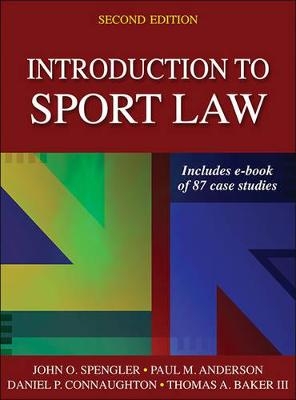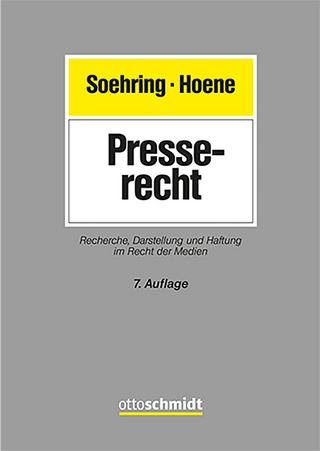
Introduction to Sport Law With Case Studies in Sport Law
Human Kinetics (Verlag)
978-1-4504-5700-2 (ISBN)
- Titel erscheint in neuer Auflage
- Artikel merken
Introduction to Sport Law With Case Studies in Sport Law, Second Edition, provides students with comprehensive information on the fundamental legal issues in sport and sport management using a jargon-free approach that is accessible to readers with little or no legal background. The content covers legal and management matters most commonly found in sport management, including liability issues, protecting the legal rights of athletes and employees, and managing legal risk. These texts contain straightforward examples and case studies that deliver timely information to ground sport law theory in practical applications.
Fully updated and expanded, Introduction to Sport Law, Second Edition, helps students understand the types of law that are most relevant to sport management professionals. New references and updated court cases throughout the text allow students to see laws and issues from a contemporary point of view to further their comprehension. A new chapter on labor law adds a current perspective for students and sport management professionals.
Introduction to Sport Law, Second Edition, is organized in a progressive way that takes into account all law categories relevant to sport management. The text presents an overview of the United States legal system, including the court system, the various types of law, and legal resources. It then explores important topics, including labor law, risk management, employment law, gender equity, intellectual property, agency law, tort law, constitutional law, antitrust law, and contract law.
Each chapter provides students with unique insight on the law at hand, examining its relevance from the perspective of both sport management and law professionals, and provides an understanding of its real-world application. Objectives and a glossary of terms to assist students with comprehension and knowledge retention are included in each chapter, and many examples are used to assist in grounding the theory. In the Courtroom sidebars present discussion questions, comprehension checks, and applied perspectives, while Moot Court Cases give students an opportunity to debate hypothetical scenarios and apply principles that they have recently learned to conceptualize the technicalities of sport law.
Students also gain access to the e-book Case Studies in Sport Law, Second Edition, by Andrew T. Pittman, John O. Spengler, and Sarah J. Young. This companion resource features abridged versions of 87 court cases that represent many of the multifaceted aspects of sport law, including antitrust law, constitutional law, contract law, employment law, intellectual property, products liability, statutory law, Title IX, and tort law. The relevant cases are noted in each chapter of the text and are followed by review questions that can test student comprehension, be used for review, and prompt in-class discussions. Instructors will find answers to these review questions in the instructor guide, along with a test package and presentation package to assist with course preparation.
Introduction to Sport Law With Cases Studies in Sport Law, Second Edition, presents a comprehensive examination of legal issues in sport. Through its focus on legal concepts with direct application to the sport manager’s role and a presentation devoid of legalese, this text provides readers with the information they need in order to feel confident with the funndamentals of sport law.
John O. Spengler, JD, PhD, is a professor and director of the University of Florida’s Sport Policy and Research Collaborative. Spengler received his bachelor’s degree from Wake Forest University, his law degree from the University of Toledo, and his PhD from Indiana University. His research focuses on legal and policy issues relevant to sport and recreation, obesity prevention and physical activity, and structural environmental factors (social and physical) that influence health. Spengler’s research has been funded by the Robert Wood Johnson Foundation to study policies relevant to improving opportunities for physical activity. He is a volunteer with the American Heart Association, where his research has informed AHA policy and advocacy efforts at the state and national level to improve community health through physical activity. Spengler’s work has been published in numerous journals, books, and commissioned research papers and presented through webinars, panels, and professional presentations. He serves on the advisory board of the Aspen Institute’s Project Play and Physical Literacy Working Group and has served as president of the Sport and Recreation Law Association, associate editor of the Journal of Legal Aspects of Sport, and a board member for SHAPE America. Honors include selection as a University of Florida Research Foundation professor in recognition of research and scholarly achievements and two-time UF College of Health and Human Performance Teacher of the Year. He also received the Fame for Fitness Award from the Florida Sports Hall of Fame in recognition of his work on childhood obesity prevention, the University of Toledo School of Law Order of the Coif Jurisprudence Award, and SHAPE America’s Distinguished Scholar award. He is a research fellow for both the SHAPE America Research Consortium and the Sport and Recreation Law Association. Spengler resides in Gainesville, Florida. He enjoys sports and outdoor activities. Paul M. Anderson, JD, is the associate director of the National Sports Law Institute of Marquette University Law School in Milwaukee, Wisconsin. He is also associate director and professor in the sport law program at Marquette University Law School, the most comprehensive and advanced sport law program in the world. He has taught, written, and consulted on all areas of sport law for the past two decades. As part of his role in the National Sports Law Institute, Anderson researches all areas of sport law and coordinates multiple publications for the sport industry, including annual surveys devoted to developments in the field. He has written numerous books, book chapters, articles, and other publications related to various areas of sport law. In his law practice, Anderson has represented many clients in the sport industry. Anderson is co-faculty advisor to the Marquette Sports Law Review, former editor of the Journal of Legal Aspects of Sport, and managing editor of the Journal of Sport and Social Issues. He is a reviewer for the Journal of Legal Aspects of Sport, Communication and Sport, and International Sports Law Journal. He is past chair of the Sports and Entertainment Law section of the State Bar of Wisconsin. Anderson is a member of the Sport and Recreation Law Association, the Sports Lawyers Association, American Bar Association’s Forum on the Entertainment & Sports Industries, and the International Association of Sports Law. In 2008, Anderson received the Faculty Advisor of the Year Award from the Marquette Moot Court Association. He also received the President’s Award from the Sport and Recreation Law Association in 2005 and was awarded the Sports Law Alumnus of the Year Award from the Sports Law Alumni Association of Marquette University Law School in 2003. In 2002 he received a Leadership Award from the Society for the Study of the Legal Aspects of Sport and Physical Activity. In his free time, Anderson enjoys reading science fiction, writing, and watching and participating in various sports. He and his wife and daughters reside in Milwaukee. Daniel P. Connaughton, EdD, is a professor in the sport management program and an associate dean in the College of Health and Human Performance at the University of Florida. His teaching and research are focused on the study of law and risk management in sport and physical activity programs. A frequent conference presenter and author of many publications, Connaughton has received several teaching and research awards. The American Heart Association has funded his research investigating implementation constraints and risk management practices related to automated external defibrillators in sport and recreation programs. Since 2008 he has served as the principal investigator of the Bicycle Safety and Risk Management Project, which is funded by the Florida Department of Transportation Safety Office. Connaughton is a research fellow with the Sport and Recreation Law Association and Research Consortium of SHAPE America. With an educational background in exercise and sport sciences, Connaughton also holds advanced degrees in recreation administration (University of Florida), physical education (Bridgewater State College), and sport management (Florida State University). Connaughton has held management positions in campus and public recreation departments, aquatic facilities, and health and fitness programs. He holds several professional certifications and frequently serves as a consultant and expert witness in sport and physical activity–related lawsuits. In his free time, Connaughton enjoys cycling, running, and traveling. He resides in Gainesville. Thomas A. Baker III, JD, PhD, is a commercial litigator turned associate professor in the sport management and policy program at the University of Georgia. He conducts research in sport management that focuses on the application of the law to sport. Within that focus he specializes in how commercial laws influence sport marketing, such as legal issues concerning brand management and the use of social media in sport marketing. Additionally, he conducts risk management research focused on preventing sexual abuse in sport, and terrorism management at sports facilities. He is also editor in chief of the Journal of Legal Aspects of Sport. Dr. Baker received his PhD in sport management from the University of Florida, where he was a Dr. Charles W. LaPradd PhD fellow and earned the Clifford A. Boyd Graduate Scholarship Award and the Norma M. Leavitt Scholarship. He earned his JD from Loyola University New Orleans School of Law, where he graduated in the top 10 percent of his class (cum laude) earning the distinction of William L. Crowe Sr. Scholar.
Chapter 1. U.S. Legal System
Sources of U.S. Law
U.S. Court System
Types of U.S. Law
Legal Resources
Summary
Chapter 2. Tort Law and Product Liability
Negligence
Intentional Torts
Product Liability
Summary
Chapter 3. Risk Management
Perspectives on Approaching Risk Management
Risk Management Process
Summary
Chapter 4. Agency Law
Sport Agents
Principals of Agency Law
Regulation of Athlete Agents
Consolidation
Disputes
Summary
Chapter 5. Contract Law
Basics of Contract Law
Sport Contracts
Contract Law Issues
Summary
Chapter 6. Employment Law
Employment Relationship
Discrimination
Sexual Harassment
Federal Employment Laws
Summary
Chapter 7. Constitutional Law
First Amendment
Fourteenth Amendment
Fifth Amendment
Summary
Chapter 8. Gender Equity
Title IX
Sexual Harassment
Employment Discrimination
Summary
Chapter 9. Intellectual Property Law
Trademark Law
Copyright Law
Right of Publicity
Patent Law
Ambush Marketing
Summary
Chapter 10. Antitrust Law
Federal Antitrust Laws
Application to Professional Team Sports
Application to Individual Performer Sports
Application to University Sports
Summary
Chapter 11. Labor Law
Alicia Jessop, JD
| Verlagsort | Champaign, IL |
|---|---|
| Sprache | englisch |
| Maße | 216 x 279 mm |
| Gewicht | 1111 g |
| Themenwelt | Recht / Steuern ► EU / Internationales Recht |
| Recht / Steuern ► Privatrecht / Bürgerliches Recht ► Medienrecht | |
| ISBN-10 | 1-4504-5700-2 / 1450457002 |
| ISBN-13 | 978-1-4504-5700-2 / 9781450457002 |
| Zustand | Neuware |
| Haben Sie eine Frage zum Produkt? |
aus dem Bereich



